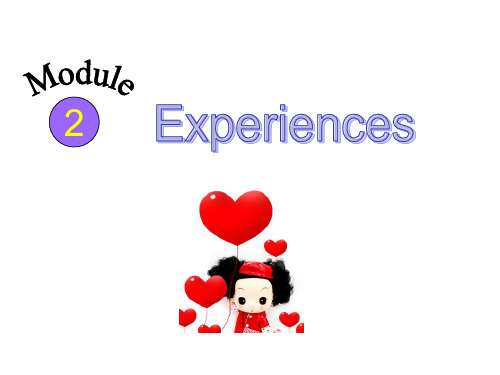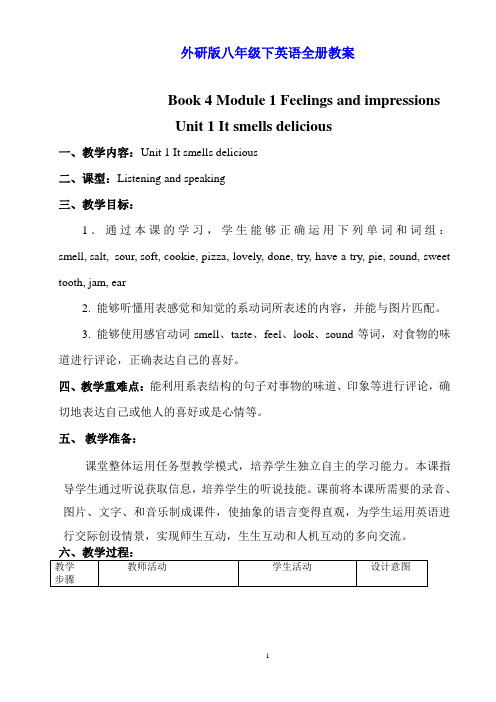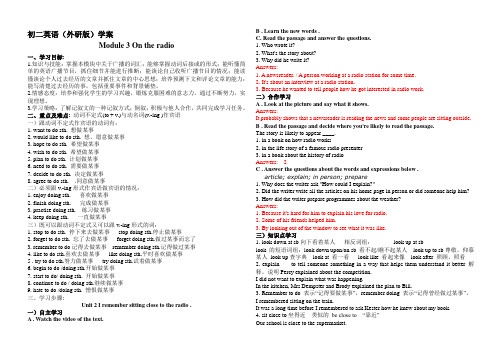外研版八年级英语下册 Module 3 unit2教案
Module 3 Unit 2 教学设计 外研版(三起)英语四年级下册

一、过度
(1) 学习新单词:假期 通过五一
(1) (展示 5 月份日历表图片)In May, we will
holiday
劳动节假
have a holiday. Holiday(教读)
五一劳动节/ May Day. 期引出
(2) what is it? It's May day.Do you like it? I like it
③.通过感知课文情境中用 will+动词原形来讨论将来可能发生的事情和一周的计划安排,找出关键词,
对应匹配星期相关信息,培养学生自主学习,获取关键信息的能力。
教学重难点
通过介绍自己的假期一周安排,巩固拓展本课的目标语言,培养学生的想象力,计划安排的能力。并
乐于参与,积极用英语交流的意识。
教学内容分析 本课是《新标准英语》三起四年级下册 Module 3 Unit 2 On Monday I’ll go swimming.本单元的
生英语输出。而且在课堂中,老师不断鼓励学生大胆进行想象和表达,帮助学生树立自信心。
(3)教学活动时间、节奏安排合理,层层递进,环环相扣,尊重学生认知发展规律和心理特点,由
易到难,活动丰富,始终抓住学生的兴趣,也紧紧联系学生生活实际。学生在每个活动中参与性高,
能在最后 Make your plan 中完善t.
星期/week A week 7 days(评价)
一起唱 Activity 1 的歌曲
处
理
1. What day is it? 2. How about today? Yes, today is Tuesday
Sunday Monday Saturday Tuesday
What will you do on Saturday?(写)
外研版英语八年级下册教学课件:Module 2 Unit 3 Language in use

Complete the postcard. Use the list of Things to do in China to help you. Things to do in China! go to Beijing
see the Beijing Opera
climb the Great Wall
Palace Museum
I have ever been to the Palace Museum.
Hong Kong Disneyland
They have visited Hong Kong Disneyland.
Roast duck
not eat; roast duck
hasn’t eaten Beijing roast duck The boy _______________________________.
Yes, I have. / No, I haven’t.
Complete the sentences.
1. He/She _____________________ a Western meal. 2.He/She ______________________ in another city. 3.He/She ______________________ a singing
competition.
4. He/She _____________________ by train. 5.He/She ______________________ the seaside. 6.He/She ______________________ seafood. 7.He/She ______________________ for his/her parents.
外研版八年级英语下册Module3 Unit2 课件

→ found (过去式 / 过去分词)
4. travel→ travelled (过去式)
→ travelled (过去分词)
5. possible→ impossible (反义词)
序号 音 标
词性及词义
adj. 太阳的;与太阳有关
4
的
5
n. 系统;体系
自测1 自测2
6
n. 群;组
7
n. 星系
8
n. 宇宙
序号 音 标
词性及词义
自测1 自测2
9
n. 光;光线;光亮
adj. (事情)办不到的,不
10
可能的
11
adv. 在远方
12
v. 联系;交流
单词拓展
1. life→ lives (复数)
2. 然而,我们还没有在任何其他行星上发现生命。 However, we have not found life on any other planets yet. 3. 它们中没有一颗(行星)有像地球那样的环境。 None of them has an environment like that of the earth.
Module 3 Journey to space Unit 2 We have not found life on any
other planets yet.
单词自测
序号 音 标
词性及词义
自测1 自测2
pron.没有一人;没有一
1
个;一点儿也没有
2
n. 环境
pron.那,那个(指代已被
3
提及的事物)
外研版初中英语八年级下册整册教学设计

外研版八年级下英语全册教案Book 4 Module 1 Feelings and impressionsUnit 1 It smells delicious一、教学内容:Unit 1 It smells delicious二、课型:Listening and speaking三、教学目标:1.通过本课的学习,学生能够正确运用下列单词和词组:smell, salt, sour, soft, cookie, pizza, lovely, done, try, have a try, pie, sound, sweet tooth, jam, ear2. 能够听懂用表感觉和知觉的系动词所表述的内容,并能与图片匹配。
3. 能够使用感官动词smell、taste、feel、look、sound等词,对食物的味道进行评论,正确表达自己的喜好。
四、教学重难点:能利用系表结构的句子对事物的味道、印象等进行评论,确切地表达自己或他人的喜好或是心情等。
五、教学准备:课堂整体运用任务型教学模式,培养学生独立自主的学习能力。
本课指导学生通过听说获取信息,培养学生的听说技能。
课前将本课所需要的录音、图片、文字、和音乐制成课件,使抽象的语言变得直观,为学生运用英语进行交际创设情景,实现师生互动,生生互动和人机互动的多向交流。
达标训练题一. 根据句意和汉语提示完成句子。
1. 这菜闻起来好香啊.The dish _______________.2. 这汤尝起来不新鲜.The soup ______________ fresh.3. 这毛衣摸起来很软很舒服。
The sweater _______________________.4. Children like _______ (小甜饼)very much.5. People should eat less ______ ( 盐) everyday.6. Oh. It’s my _______(幸运的)day. I'vepassed the exam.二. 单项选择:1. These flowers ______beautiful. I will buy some for my mother.A. lookB. soundC. hearD. taste2. The air in the countryside smells _______.A. sourB. softC. deliciousD. fresh3. The idea ________ g ood. We can try it.A. tasteB. tastesC. soundsD. sound4. This game is so interesting, please_____ .A. have a lookB. give upC. have a tryD. try some5. Last Sunday was my mother’s birthday, so I _____ a big meal for her.A. cookB. cooksC. cookedD. is cookingBook 4 Module 1 Feelings and impressionsUnit 2 I feel nervous when I speak Chinese.一、教学内容:Unit 2 I feel nervous when I speak Chinese.二、课型:Reading and writing三、教学目标:1、通过本课的学习,学生能够朗正确运用下列单词和词组:fair, glasses, proud, be proud of, jeans, pretty, stranger, nervous, message, hobby, at school , mark, love, sb. can’t wait to do sth.2、进一步学习感官动词f eel look smell taste的用法,在理解的基础上,学会用它们表达情感3、能读懂对人外貌和性格的简单描述。
外研版八年级英语下module3Unit2学案

初二英语(外研版)学案Module 3 On the radio一、学习目标:1.知识与技能:掌握本模块中关于广播的词汇;能够掌握动词后接或的形式;能听懂简单的英语广播节目,抓住细节并能进行推断;能谈论自己收听广播节目的情况;能读懂谈论个人过去经历的文章并抓住文章的中心思想;培养预测下文和评论文章的能力;能写清楚过去经历的事,包括重要事件和背景铺垫。
2.情感态度:培养和强化学生的学习兴趣,锻炼克服困难的意志力。
通过不断努力,实现理想。
3.学习策略:了解记叙文的一种记叙方式;倒叙;积极与他人合作,共同完成学习任务。
二、重点及难点: 动词不定式(to + v.)与动名词(v.-ing )作宾语一)跟动词不定式作宾语的动词有:1. want to do sth. 想做某事2. would like to do sth. 想、愿意做某事3. hope to do sth. 希望做某事4. wish to do sth. 希望做某事5. plan to do sth. 计划做某事6. need to do sth. 需要做某事7. decide to do sth. 决定做某事8. agree to do sth. .同意做某事二)必须跟v.-ing形式作宾语做宾语的情况:1. enjoy doing sth. 喜欢做某事2. finish doing sth. 完成做某事3. practise doing sth. 练习做某事4. keep doing sth. 一直做某事三)既可以跟动词不定式又可以跟v.-ing形式的词:1. stop to do sth. 停下来去做某事stop doing sth.停止做某事2. forget to do sth. 忘了去做某事forget doing sth.做过某事而忘了3. remember to do记得去做某事remember doing sth.记得做过某事4. like to do sth.喜欢去做某事like doing sth.平时喜欢做某事5 . try to do sth.努力做某事try doing sth.试着做某事6. begin to do /doing sth.开始做某事7. start to do/ doing sth. 开始做某事8. continue to do / doing sth.继续做某事9. hate to do /doing sth. 憎恨做某事三、学习步骤:Unit 2 I remember sitting close to the radio .一)自主学习A . Watch the video of the text.B . Learn the new words .C. Read the passage and answer the questions.1. Who wrote it?2. What's the story about?3. Why did he write it?Answers:1. A newsreader. / A person working at a radio station for some time.2. It's about an interview at a radio station.3. Because he wanted to tell people how he got interested in radio work.二)合作学习A . Look at the picture and say what it shows.Answers:It probably shows that a newsreader is reading the news and some people are sitting outside.B . Read the passage and decide where you're likely to read the passage.The story is likely to appear ____.1. in a book on how radio works2. in the life story of a famous radio presenter3. in a book about the history of radioAnswers: 2C . Answer the questions about the words and expressions below .article; explain; in person; prepare1. Why does the writer ask "How could I explain?"2. Did the writer write all the articles on his home page in person or did someone help him?3. How did the writer prepare programmes about the weather?Answers:1. Because it's hard for him to explain his love for radio.2. Some of his friends helped him.3. By looking out of the window to see what it was like.三)知识点学习1. look down at sb向下看着某人相反词组:look up at sblook 的短语词组:look down upon/on sb 看不起/瞧不起某人look up to sb尊敬,仰慕某人look up查字典look at 看一看look like 看起来像look after 照顾,照看2. explain to tell someone something in a way that helps them understand it better 解释,说明Percy explained about the competition.I did not want to explain what was happening.In the kitchen, Mrs Dempster and Brody explained the plan to Bill.3. Remember to do 表示“记得要做某事”,remember doing 表示“记得曾经做过某事”。
新外研版八年级英语下册导学案-Module 3-Journey to space(U1-U3)

外研版八年级英语下册导学案Module 3 Journey to spaceUnit 1 Has it arrived yet?【学习目标】1. 知识目标:熟练掌握本单元的单词、短语和重点句型。
2. 能力目标:能够读懂关于航空航天的短文。
3. 情感目标:培养学生的科技技术意识,引导学生积极探索未知。
【重点及难点】能够读懂关于航空航天的短文。
【学习步骤】:一、课前预习【自主学习】请同学们将预习中的疑难问题写出来。
Ⅰ根据汉语意思默写单词还;但是;已经模型;典型;[航] 宇宙飞船火星发现,找到宇航员,航天员;新闻,消息工程;计划地球;地表月亮;月球行星达到;抵达Ⅲ. 根据句意及汉语提示完成单词。
1. Yang Liwei is a famous _________ (宇航员) of our country.2. They have __________ (发现) many kinds of plants in the forest.3. We haven’t seen each other ________(最近).4. My father watches TV to get the ________ (最新的) news.5. The ______ (地球) goes round the Sun.二、课堂学习过程【合作探究】Step1. Lead inTalk about the questions.Do you know anything about the universe?Is the earth travelling in the universe?Step2.Listen and number the words as you hear them.earth land message moon news planetreach scientistStep3.Listen again and complete the notes.● news about the trip to (1) _________● journey of (2) _________ months● has not sent back any (3) _________ yet● hope to find (4) _______ on MarsS tep4. Watch,read the dialogue and do the exercises.1. Tony has just made a model of the _______.A. space stationB. spaceshipC. rocket2. ______ hasn’t started his homework yet.A. TonyB. DamingC. Jenny3. Some scientists have sent a spaceship to _______.A. the moonB. the sunC. Mars4. It has taken _______ to get to Mars.A. two monthsB. several daysC. several months5. The astronauts ______ life on Mars.A. haven’t discoveredB. ha ve discoveredC. have seen6. There aren’t any astronauts in the ____to Mars.A. spaceshipB. planeC. space stationStep5. Read the dialogue and answer the questions:1.What school project has Daming and Tony got?2.How does Daming feel about the school project?3.What news has Tony heard?4. Has anyone been to Mars? Why?5. Who has been to Mars?Step6. Read again and complete the passage with the correct form of the words in the box.Arrive discover planet send yetIn today’s news, Tony has heard that scientists have a spaceship to Mars and it has on the after a journey of several months from the earth. Scientists have notlife on Mars And no astronaut has ever been to Mars because it is far away.Step7. Check the true sentences.(T or F)( ) 1.The spacecraft has reached Mars.( ) 2. It has landed.( ) 3. It has already sent messages back to Earth.( ) 4. They have found life on the moon.( ) 5. They have found life on MarsStep8.Work in pairs and tell your partner about…1 …something you’ve borrowed this week.2 …something you’ve done recently.3 …a model of something you have seen.4 …something scientists have discovered.Example:A: What have you borrowed recently?B: I have borrowed a story book from the school library.Step9.Listen and underline the words the speaker stresses.1. I’ve just made a model spaceship for our school project.2. I haven’t started yet because I’m not sure how to make it.3. Has it arrived yet?4. Astronauts have already been to the moon.Now listen again and repeat.Step10.Make lists of what we have and have not done in space travel.We have_________________________________________________________________________________________ ___________________________________We have not…___________________________________________________________________________________________________【知识结构】(一)、What are you up to? 你在做什么呢?●up to 表示“正在干,从事着”。
外研版八年级下Module3_Unit2教案
Module3 Unit 2 I remember sitting close to the radio .一、教学目标:1.知识与技能:掌握本模块中关于广播的词汇;能够掌握动词后接动名词/view/26625.htm或动词不定式/view/26732.htm的形式;能听懂简单的英语广播节目/v?ct=301989888&rn=20&pn=0&db=0 &s=8&word=%D3%A2%D3%EF%B9%E3%B2%A5%BD% DA%C4%BF&fr=ala0,抓住细节并能进行推断2.过程与方法:1)通过广播这种途径获取更广泛的英语信息2)积极与他人合作,共同完成学习任务。
3.情感态度:通过了解电台广播的有关内容,增强学生的学习兴趣。
二、重点: To know how the writer began his first job in radio.难点:To write a short passage about an imaginary job experience.三、学习步骤:一)复习检测:1.Read the words: explain/ seem /sound /check/voice/ listener /weekly/ article /microphone/ glass /sound /checklook down /close down /ask for2.Translate sentences:1)一定记住注意红色信号灯。
2)停止说话!3)我们决定听的内容和见谁。
4)我喜欢听足球比赛的结果。
5)我想成为一名体育播音员。
二)读前导入:Look at the picture and say what it shows.三)多层阅读:1.自读课文,完成:1)Who wrote it?2.听读课文前三段,完成:What did the radio studio manager ask?3.听读课文4至6段,判断下列句子的正误:1)When I was about six years old ,Iremember sitting close to the radio in the living room.( )2) At the age of nine, I asked for jobs in big radio stations.( )3)I was interested in reading.( )4)I prepared the weekly programmes with my friends at junior high school.( )4.听读课文7至结尾部分,完成:What did the radio studio manager ask?5.回顾课文,完成课本第3题。
Module 3 Journey to space Unit 3初中英语外研版八年级下册同步备课课件
【辨析】have been to 与 have gone to (1)have gone to表示“已到达某地”。说话时该人不在现场,强调尚未回来(go是方向性动词)。 例:—Where is Jim? 吉姆在哪里?
—He has gone to Beijing 他去北京了。 (2)have been to表示“曾经去过某地”。现在已经不在那里了(be是表示状态),后可接次数,如once、 twice、three times等,表示“去过某地几次”。也可和just、never和ever等连用。
随
Mars
学
随
solar system
the sun
练
一
spaceship
SPACE
the earth
space travel
the moon
astronaut space station
09
Complete the passage with the correct form of the words in the box.
Unit 2
Try to remember them
1.hundreds of millions of years 2.on the earth 3.On any other planets 4.go around 5.none of 6.don’t think 7.The solar system 8.The Galaxy 9.The Milky Way 10.billions of 11.one of 12.in the universe 13.far away 14.It’s impossible to imagine 15.Send…to… 16.far enough 17.ask the questions municate with
外研版英语八年级下册Module3Unit1Hasitarrivedyet教学设计
外研版英语⼋年级下册Module3Unit1Hasitarrivedyet教学设计外语教学与研究出版社《新标准》英语8年级下册Module 3 Journey to spaceUnit 1 Has it arrived yet?⼀、教材分析本模块以太空之旅为话题,着重介绍了⽕星探索以及宇宙中太阳系的部分知识。
本节课是⼀节听说课型的新授课。
作为模块的第⼀课,它为第⼆、三单元不仅提供了话题和语境,同时也为学⽣们后来的学习扫清语⾔和⽂化的障碍。
在第⼀单元中,学⽣的听说活动都是围绕科学家已经完成和还未完成的太空任务⽽展开。
本单元通过Daming和Tony 的谈话,介绍了⼈类太空探索的壮举。
通过开展听、说、读等语⾔实践活动展⽰现在完成时态,为第⼆单元的学习奠定基础。
本单元的重点是学⽣对听⼒材料主题和具体信息的捕捉训练。
难点使学⽣能够有效地掌握信息,并运⽤所学词汇和现在完成时进⾏交流。
⼆、教学⽬标1. 语⾔技能⽬标:能够听懂对⽕星计划的陈述,能够介绍⼈类对太空的探索经历,2. 语⾔知识⽬标:能够⽤现在完成时描述⼈类太空探索计划,正确使⽤just, already, yet。
能够正确使⽤下列单词:earth, yet, planet, latest, project, discover;3. ⽂化意识⽬标:通过学习中国“神州九号”、“神州⼗号”载⼈航天飞机太空探索的相关知识增强民族意识和⾃豪感。
引导学⽣学习⼀些太空科学知识,实现跨学科交流。
4. 学习策略⽬标:⾃主学习能够结合个⼈的情况预习教材和拓展。
合作学习能够与同学交流学习⼼得体会,共享学习策略。
5.教具准备:视频课件、学案、点读笔等。
三、教学设计在整个的教学设计中,笔者主要采取的是⼩组合作教学法和任务教学法。
借助具体任务帮助学⽣理解对话,并提炼对话的主要信息。
本节课的话题是太空之旅,学⽣对此话题并不是很熟悉,⼀些术语理解起来也不是很容易。
正鉴于此,本课的创新之处在于⼒图突破传统的对话教学模式,利⽤三轮不同形式的任务,化难为易,化繁为简,结合表格帮助学⽣去理解和体会⽕星探索等太空问题, 突破本课的难点。
第一课时外研版英语八年级上册Module3Unit2教学设计
4.互动交流:充分利用课堂时间,组织丰富多样的互动交流活动,如小组讨论、角色扮演等,让学生在交流中学习,提高口语表达能力。
5.反馈评价:建立多元化、全面的评价体系,关注学生在学习过程中的表现,及时给予鼓励和指导,帮助学生建立自信心。
同时,八年级学生正处于青春期,个性鲜明,求知欲强,但注意力容易分散。因此,教师在教学过程中应注重激发学生的学习兴趣,运用生动、形象的教学手段,引导学生积极参与课堂活动,提高课堂学习效果。
三、教学重难点和教学设想
(一)教学重难点
1.重点:本模块的重点在于帮助学生掌握描述学习习惯、方法和目标的语言表达,如一般现在时、现在进行时和一般将来时,以及词汇和短语的使用。
2.利用多媒体教学资源,如听力材料、阅读文章等,引导学生自主学习和探究学习。
3.设计丰富的课堂活动,如角色扮演、情景模拟等,帮助学生巩固所学知识,提高语言运用能力。
4.通过课堂提问、小组讨论等形式,培养学生独立思考和解决问题的能力。
(三)情感态度与价值观
1.培养学生树立正确的学习观念,认识到良好的学习习惯对学习的重要性。
2.学生独立完成练习题,提高自己的语言运用能力。
3.教师针对学生的答题情况,给予及时反馈和指导,帮助学生查漏补缺。
4.教师组织学生进行角色扮演、情景模拟等实践活动,让学生在实际语境中运用所学知识。
(五)总结归纳
1.教师引导学生回顾本节课所学内容,总结描述学习习惯、方法和目标的语言表达。
2.学生分享自己在课堂上的收获和感悟,教师给予肯定和鼓励。
6.拓展延伸:结合课本内容,拓展相关话题,如学习策略、时间管理等,引导学生将所学知识运用到实际生活中,提高综合素质。
